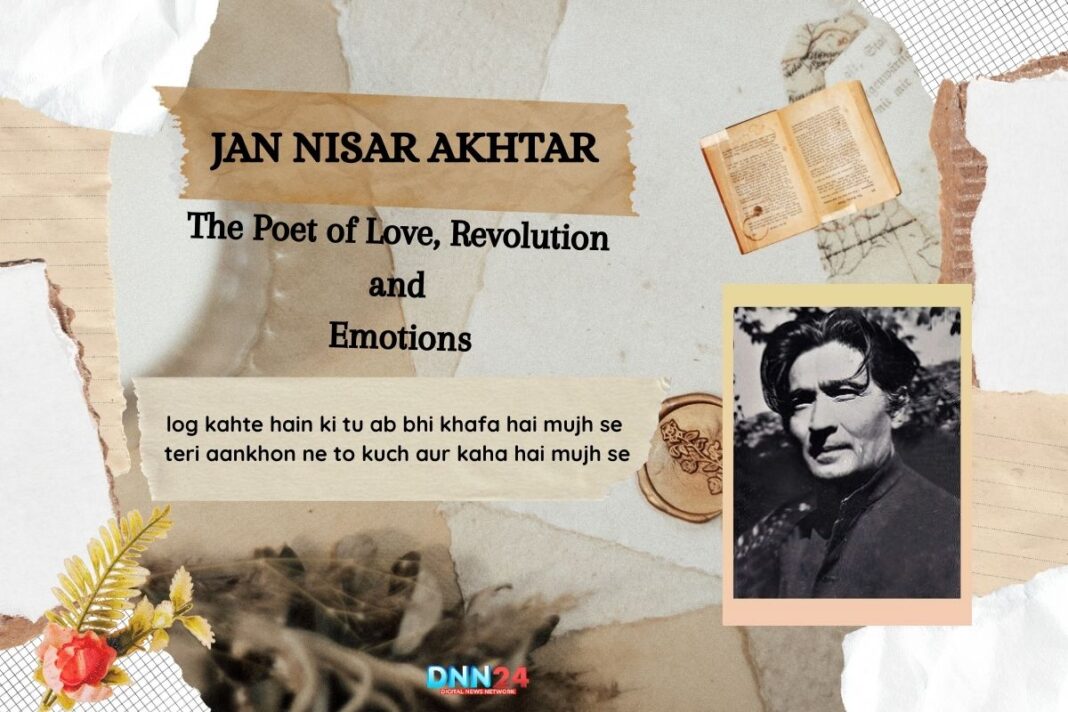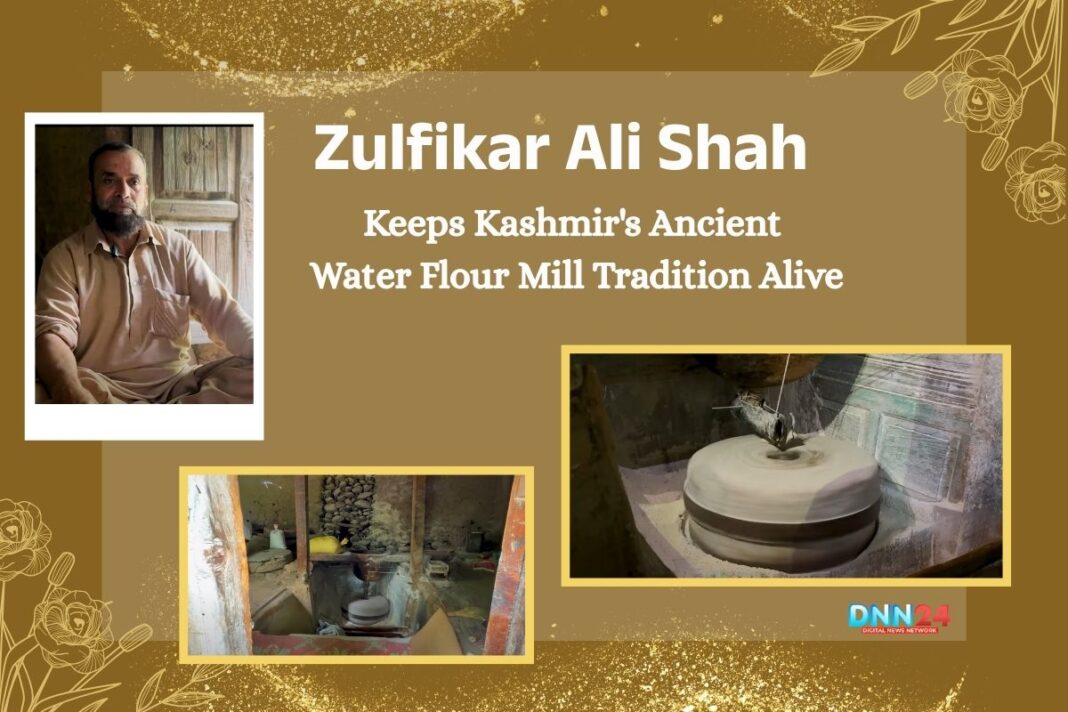In the world of Urdu poetry, some names shine like eternal stars, and Jan Nisar Akhtar is undoubtedly one of them. Born as Syed Jan Nisar Hussain Rizvi on February 18, 1914, in Gwalior, he came from a family where poetry flowed in the blood like a beautiful river. His father was the great classical poet ‘Muztar’ Khairabadi, and his grandfather, Maulana Fazle Haq Khairabadi, was also a renowned poet.
aahaT si koi aae to lagta hai ki tum ho
Jan Nisar Akhtar
saya koi lahrae to lagta hai ki tum ho
Growing up in such a literary household was like living in a garden full of beautiful words and deep emotions. From his childhood days, Jan Nisar was surrounded by the magic of poetry. The atmosphere at home was so rich with literary discussions that it was natural for him to develop a love for words and expressions.
ashaar mere yun to zamane ke liye hain
Jan Nisar Akhtar
kuchh sher faqat un ko sunane ke liye hain
Poetry was his birthright, passed down through generations like a precious family jewel. This early exposure to the world of literature shaped his understanding of language and emotions in a way that would later make him one of the most celebrated poets of his time.
hum se bhaga na karo dur ghazalon ki tarah
Jan Nisar Akhtar
hum ne chaha hai tumhein chahne walon ki tarah
The Aligarh Days and Progressive Movement
When Jan Nisar Akhtar went to Aligarh Muslim University for his higher education, it was like entering a goldmine of literary talent. Those were the golden days of AMU when the campus was buzzing with intellectual activities and scholarly discussions. Here, he met some of the greatest writers and poets of his generation – Ali Sardar Jafri, Khwaja Ahmad Abbas, Majaz, Sibte Hasan, Manto, Moin Ahsan Jazbi, Akhtar-ul-Iman, Hayatullah Ansari, and Ismat Chughtai.
log kahte hain ki tu ab bhi KHafa hai mujh se
Jan Nisar Akhtar
teri aankhon ne to kuchh aur kaha hai mujh se
This was the time when the Progressive Writers’ Movement was gaining momentum in India, and these young writers were at its forefront. The atmosphere at Aligarh was electric with new ideas about literature, society, and politics. Jan Nisar, along with his friends, was deeply influenced by Marxist ideology and the progressive movement.
sau chand bhi chamkenge to kya baat banegi
Jan Nisar Akhtar
tum aae to is raat ki auqat banegi
After completing his M.A. in Urdu with a gold medal in 1935-36, his poetry took on a new colour. His ghazals and nazms started reflecting themes of protest and rebellion. Poems like ‘Muwakkil Se’, ‘Dana-e-Raaz’, ‘Panch Tasveeren’, and ‘Riyasat’ showed his philosophical depth and social consciousness. These were not just beautiful verses but powerful statements about society and its problems.
hum ne kaTi hain teri yaad mein raaten aksar
Jan Nisar Akhtar
dil se guzri hain sitaron ki baraaten aksar
From Teaching to Tinseltown
After leaving AMU, Jan Nisar Akhtar spent some years teaching Urdu as a professor at Victoria College in Gwalior and later at Saifia College in Bhopal. However, his heart was not in the routine of academic life. He was a free spirit, and the classroom walls seemed too narrow for his creative soul. In 1952, he made a bold decision that would change his life forever – he left his secure job and moved to Mumbai, the city of dreams and cinema.
tu is qadar mujhe apne qarib lagta hai
Jan Nisar Akhtar
tujhe alag se jo sochun ajib lagta hai
Mumbai in the 1950s was like a magnet for creative people. The film industry was flourishing, and many writers and poets had already made their mark there. Great names like Krishen Chander, Ismat Chughtai, Khwaja Ahmad Abbas, Mulkraj Anand, Sahir Ludhianvi, Sardar Jafri, Kaifi Azmi, Majrooh Sultanpuri, and Akhtar-ul-Iman were already established in the city.
jab lagen zaKHm to qatil ko dua di jae
Jan Nisar Akhtar
hai yahi rasm to ye rasm uTha di jae
Jan Nisar had a close friendship with Sahir Ludhianvi, and he spent most of his early Mumbai days with him. This friendship was not just personal but also professional, as both poets shared similar views about life and literature. The vibrant cultural atmosphere of Mumbai gave Jan Nisar new opportunities to express his creativity and reach a wider audience through films.
zulfen sina naf kamar
Jan Nisar Akhtar
ek nadi mein kitne bhanwar
sadiyon sadiyon mera safar
manzil manzil rahguzar
Bollywood Success and Memorable Songs
Jan Nisar Akhtar’s entry into the film world was nothing short of spectacular. His first break came in 1955 with the film ‘Yasmin’, for which he wrote beautiful songs like ‘Bechain Nazar Betaab Jigar’, ‘Mujh Pe Ilzam-e-Bewafai Hai’, and ‘Aankhon Mein Sama Jao’. These songs became instant hits and established him as a talented lyricist in the film industry.
achchha hai un se koi taqaza kiya na jae
Jan Nisar Akhtar
apni nazar mein aap ko ruswa kiya na jae
His collaboration with music director O.P. Nayyar proved to be golden. Their partnership produced many successful films, including ‘Naya Andaaz’, ‘Ustaad’, ‘Chhoo Mantar’, ‘Ragini’, and the unforgettable ‘CID’. Who can forget the evergreen songs from ‘CID’ – ‘Ae Dil Hai Mushkil Jeena Yahan’ and ‘Aankhon Hi Aankhon Mein Ishara Ho Gaya’? These songs are still hummed by people of all ages today.
Ankho hi ankho me ishara ho gaya
Jan Nisar Akhtar
Baithe baithe jine ka sahara ho gaya
During his film career, he wrote lyrics for around 80 films, including ‘Anarkali’, ‘Sushila’, ‘Rustam Sohrab’, ‘Prem Parvat’, ‘Trishul’, ‘Razia Sultan’, and ‘Noorie’. His collaboration with music director Khayyam produced timeless classics like ‘Aap Yun Faaslon Se Guzarte Rahe’, ‘Ye Dil Aur Unki Nigahon Ke Saye’, and ‘Ae Dile Nadaan’. His work in the film ‘Noorie’ even earned him a Filmfare Award, recognising his contribution to Indian cinema.
Aye Dil Hai Mushkil Jeena Yahan
Jan Nisar Akhtar
Zara Hat Ke Zara Bach Ke, Yeh Hai Bombay Meri Jaan
Poetry Beyond Traditional Boundaries
What made Jan Nisar Akhtar special was his ability to break free from the traditional romantic themes of Urdu poetry. He brought poetry closer to real life and social issues. His verses carried the spirit of revolution and spoke against capitalism and social injustice. He believed that poetry should not just be about love and beauty but should also reflect the struggles and hopes of ordinary people.
ai dard-e-ishq tujh se mukarne laga hun main
Jan Nisar Akhtar
mujh ko sambhaal had se guzarne laga hun main
His concept of national unity and brotherhood can be seen in many of his poems. Sometimes his poetry would flow like a romantic river, sometimes it would thunder like a philosophical storm, and sometimes it would wave like a flag of rebellion. He had the rare ability to switch between different moods and themes while maintaining the beauty and depth of his expression.
dil ko har lamha bachate rahe jazbaat se hum
Jan Nisar Akhtar
itne majbur rahe hain kabhi haalat se hum
His poems were not just words but mirrors that reflected the society of his time. Through his verses, he tried to awaken people’s consciousness about social issues while never losing the lyrical beauty that makes poetry so appealing.
har ek ruh mein ek gham chhupa lage hai mujhe
Jan Nisar Akhtar
ye zindagi to koi bad-dua lage hai mujhe
Personal Life and Philosophy
Jan Nisar Akhtar had a bohemian personality and was free from all kinds of social conventions and rigid traditions. He was truly progressive in his thinking and liberal in his approach to life. His friend Joy Ansari once described him as a charming young man who would appear in mushairas wearing spotless sherwanis, with carefree curls and an attractive face. He was very social, fun-loving, and had a cheerful disposition that made him popular in literary circles.
hausla kho na diya teri nahin se hum ne
Jan Nisar Akhtar
kitni shiknon ko chuna teri jabin se hum ne
A significant part of his life was dedicated to his wife, Safia Akhtar. Her untimely death had a profound impact on him, and some of his most moving poems, like ‘Khamosh Awaaz’ and ‘Khak-e-Dil’, were written after her passing. In ‘Khak-e-Dil’, he beautifully captures the pain of separation and the memories of love.
zindagi ye to nahin tujh ko sanwara hi na ho
Jan Nisar Akhtar
kuchh na kuchh hum ne tera qarz utara hi na ho
His son Javed Akhtar, who later became a famous lyricist himself, once said in an interview that his father always taught him that writing in difficult language is easy, but expressing complex emotions in simple language is the real challenge. This philosophy is clearly visible in Jan Nisar Akhtar’s work, where he made the most profound thoughts accessible to familiar readers.
zara si baat pe har rasm toD aaya tha
Jan Nisar Akhtar
dil-e-tabah ne bhi kya mizaj paya tha
Literary Legacy and Recognition
Jan Nisar Akhtar left behind a treasure trove of literary works. At Nehru’s request, he compiled a two-volume book called ‘Hindustan Hamara’, which is a precious collection of three hundred years of Indian poetry. This anthology includes ghazals and nazms that highlight patriotism, national unity, the natural beauty of the country, traditions, and the glorious past.
zindagi tujh ko bhulaya hai bahut din hum ne
Jan Nisar Akhtar
waqt KHwabon mein ganwaya hai bahut din hum ne
Some of his important books include ‘Khak-e-Dil’, ‘Khamosh Awaaz’, ‘Tanha Safar Ki Raat’, ‘Jan Nisar Akhtar-Ek Jawan Maut’, ‘Nazar-e-Butan’, ‘Salasil’, ‘Taar-e-Gareban’, ‘Pichhle Pahar’, and ‘Ghar-Aangan’ (a collection of rubaiyat). ‘Awaaz Do Hum Ek Hain’ is a compilation of his selected works. In 1976, he was honoured with the Sahitya Akademi Award for ‘Khak-e-Dil’. He also received the Maharashtra Academy Award and the Soviet Land Nehru Award for his outstanding contribution to literature.
be-murawwat bewafa begana-e-dil aap hain
Jan Nisar Akhtar
aap manen ya na manen mere qatil aap hain
Jan Nisar Akhtar passed away on August 19, 1976. He believed that “a person grows old not from the body but from the heart and mind.” This belief stayed true for him till the very end. He never let old age dominate his spirit and remained active in literary gatherings and mushairas until his last days. Today, his poetry continues to live in our hearts, giving us messages of love, revolution, and humanity that are as relevant now as they were in his time.
aaj muddat mein wo yaad aae hain
Jan Nisar Akhtar
dar o diwar pe kuchh sae hain
aabginon se na Takra pae
kohsaron se to Takrae hain
Also Read: Gulzar: From Partition’s Shadows to Poetry’s Light
You can connect with DNN24 on Facebook, Twitter, and Instagram and subscribe to our YouTube channel.



